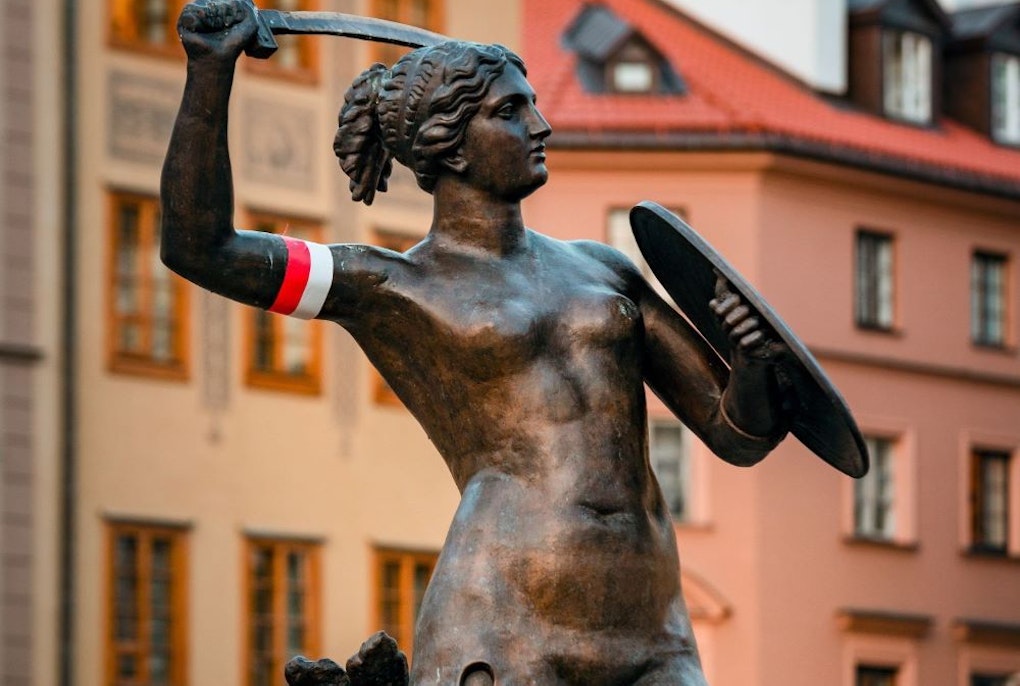
The attack on the Rule of Law in Poland and the EU at a crossroads
 Massimo Frigo
Massimo Frigo
Poland and Hungary are currently considered the European Union’s black sheep in terms of respecting the rule of law as open clashes with Brussels can attest. While this has not always been the case, nowadays concerns about the rule of law in these two countries are so serious, that the EU has taken unprecedented measures such as article 7 of the TEU - the so-called “nuclear option”.
Back in the days of 2004’s “big bang enlargement”, which brought ten new Member States into the Union, Hungary and especially Poland were considered the enfants prodiges of European integration. Their willingness to adopt the acquis communautaire and to close negotiation chapters with the Commission seemed to confirm the bloc’s socio-cultural power by means of the ability to lead these countries' post-communist transition towards liberal democracy. However, unresolved problems have emerged over the years. The transition, in fact, created both winners and losers. The key years in this process were 2010 and 2015: the former marks the second electoral win of Fidesz, nationalist party led by Viktor Orbán who has been Hungary's prime minister ever since; the latter coincided with the victory of PiS (Law and Justice), a Polish nationalist and ultraconservative party. To varying degrees of transparency, both parties attacked the democratic institutions of their respective countries. Whereas different methods were used, both exploited the contradictions of their popular base, caught between its communist past and the often-broken promises of the Western way.
Before Orbán’s second electoral term in 2010 – with the first dating back to 1998 – Hungary was on the brink of socio-economic collapse as a result of the 2008 crisis. During his election campaign, Orbán denounced the incompetence of the communist élite, which he argued was still secretly in power. He proposed an understanding of the Hungarian nation based on conservatism, Christendom, and family. He stressed the importance of regaining the sovereignty previously lost to Brussels bureaucrats. Results were astounding: Orbán's party gained such a strong majority in Parliament that it could easily change the Constitution. Thanks to the economic boom and the strong resistance against the Union’s reallocations schemes after the 2015 migratory crisis, the prime minister achieved the same constitutional majority in the following two elections. The constitutional reforms he carried out allowed him to centralise power and to hollow out the Hungarian democracy without resorting to illegal means.
Independence of the judiciary and corruption
Since 2012, attempts to centralise power have been wrought through weakening the independence of the judiciary. The clearest example is the management of tribunals, carried out by the president of the National office for the Judiciary (NOJ), which is elected by Parliament and supervised by the National Judicial Council (NJC). Various reforms have granted more and more power to the NOJ President, a political body, and prevented the NJC from effectively counterbalancing it. As a result, political influence in the judicial system has increased. Many presidents of regional courts are now nominated based on their loyalty to the president of the NOJ, strengthening this body's influence at local level. Generally speaking, declaring oneself in line with Orbán’s regime is the only way to have a successful career and to obtain the economic advantages synonymous with judiciary ranks. This last point is closely linked to the corruption issues highlighted in the European Commission’s 2020 Rule of Law Report. In cases of corruption or bribery involving civil servants or politicians, impunity levels have remained high over the years, with no specific action carried out by the government to tackle the problem.
Media freedom
In Poland, the highest media authority is the National Broadcasting Council (KRRiT). Although its independence is guaranteed by the Constitution, nomination procedures raise suspicion and suggest a degree of political influence. Moreover, Poland does not have clear laws regulating political control over the media. The biggest problems regard the rising criminalisation of defamation, which can lead to imprisonment. The cry of defamation is being used with increasing regularity against independent media, especially when they are considered critical towards the government. These issues do not change the fact Poland's situation is surely better than Hungary's. Non-governmental media enjoy higher degrees of freedom and influence, as highlighted by Reporters sans frontières.
No one would have expected the sudden attack on Polish democratic institutions carried out by PiS after its victory in the 2015 general elections. The reasons for the surprise are twofold. First, Poland’s political scene in the previous decade had been dominated by the Civic Platform (PO), a moderate, conservative and pro-European party, whose leader Donald Tusk would go on to become the president of the European Council. Secondly, PiS’ electoral campaign was not particularly aggressive, nor did it promise radical reforms to the Constitution. The turning point was the breadth of the majority obtained by PiS: an absolute majority, by which the party could govern by itself, without coalition partners. From then on PiS, informally led by Jarosław Kaczyński, started a season of centralising reforms, taking Orbán as a model. Unlike the Hungarian prime minister, though, Kaczyński never hesitated when it came to violating either the law or the Polish Constitution. Such behaviour alienated a significant chunk of Polish voters, especially those with an urban and more educated background – that is, almost half of the population. If Hungary is united under the banner of its prime minister, Poland is split into two: those who agree with Kaczyński’s nationalist, conservative and ultra-Catholic rhetoric (similarities with Orbán’s ways are clear), and those who embrace liberal, secular and moderate ideals. Independence of the judiciary PiS’ reforms politicised the higher-level judicial bodies, hollowing them out of their function and turning them into allies of the government. This was the case, for instance, of the Constitutional Tribunal and the Supreme Court. Amongst them, the retirement reform was particularly remarkable. Over a third of the Supreme Court judges were removed as a consequence, allowing PiS to replace them with friendlier figures. Reforms hit ordinary courts and the National Council for the Judiciary (NCJ) as well. Specifically, NCJ members are now nominated by the Parliament, rather than by their peers, as was the case in the past. Amendments and pieces of legislation have, of late, often been approved in a rush, in the middle of the night, with opposition MPs being absent, and/or conducted in a manner whereby Polish procedural and constitutional rules have been openly violated. Especially controversial is the fact that the Minister of Justice also holds the post of the Prosecutor general. Thus, a minister, political by definition, has the power to transfer prosecutors or to provide instructions in managing cases – even when they have a strong political component. Media freedom In Poland, the highest media authority is the National Broadcasting Council (KRRiT). Although its independence is guaranteed by the Constitution, nomination procedures raise suspicion and suggest a degree of political influence. Moreover, Poland does not have clear laws regulating political control over the media. The biggest problems regard the rising criminalisation of defamation, which can lead to imprisonment. The cry of defamation is being used with increasing regularity against independent media, especially when they are considered critical towards the government. These issues do not change the fact Poland's situation is surely better than Hungary's. Non-governmental media enjoy higher degrees of freedom and influence, as highlighted by Reporters sans frontières.
The biggest difference between the Polish and the Hungarian case study lies in the ways used to (partially) hollow out democratic institutions. Orbán’s path included over a decade of overwhelming majorities, legal Constitutional amendments, and the almost unconditional support of voters, gained by stabilising a country on the brink of disaster. Kaczyński, on the other hand, opted for more abrupt methods: he openly violated the Polish Constitution and widened the pre-existing social fracture. The diverging reactions of the two popular bases are paralleled by the role of civil society – more vibrant, plural and free in Poland, more controlled by the ruling élite in Hungary. Similarities are numerous. The first is the way the two leaders legitimised their actions. They both accused previous governments of mishandling the post-communist transition, whose excessive softness resulted in the old communist political class (known in Poland as the układ, ‘the system’) secretly remaining in power. This former elite have been accused of allegedly conspiring with liberal forces, embodied by the European Union, to weaken national identity and its Christian roots, which according to the current ruling government should instead continue to be defended and preserved. Both leaders insisted on sovereignty as a unifying factor. This was exemplified by their violent reactions to the EU’s reallocation plans for migrants, which they interpreted as attempts at ‘de-Christianisation’. In other words, both polarised the socio-political debate by framing their political agenda as the opposition against an ‘other’. This ‘other’ can either be the same in the two countries (the communists, the EU, the migrants, those who are not ‘true patriots’) or more typical of the specific national experience. In Hungary the quintessential ‘enemy’ is the Hungarian-born American billionaire George Soros, whose university was banned from Budapest in 2018. In Poland, the most recent case involved Wojciech Sadurski, an intellectual accused of defamation on the ground of various anti-government tweets. Defended within and beyond the academic world, Sadurski has become a symbol of the fight for freedom of expression. An ideal juxtaposed to those promoted by a certain populist rhetoric which, beyond the Hungarian and Polish borders, enjoys continued success in the rest of Europe as well.
This article is part of EUreka!'s collaboration with Lo Spiegone.

This content is licensed under a Creative Commons Attribution 4.0 International license except for third-party materials or where otherwise noted.